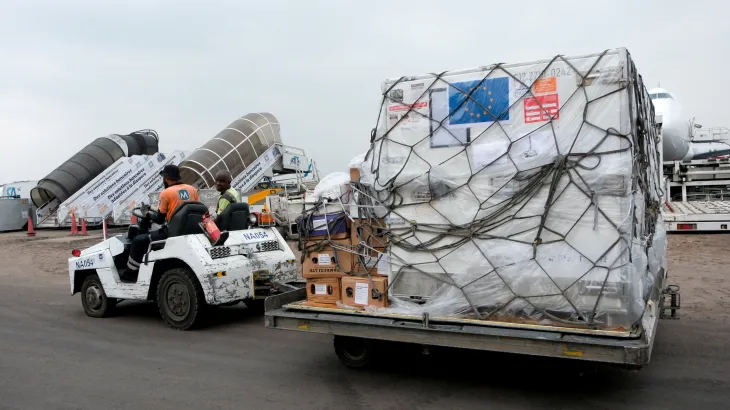The Democratic Republic of Congo received its first shipment of 100,000 doses of mpox vaccine on Thursday, three weeks after the World Health Organization declared the outbreak a global emergency affecting 12 African nations.
Western partners, including the European Union and the United States, have pledged approximately 380,000 doses of mpox vaccine. However, this falls short of the 3 million doses that Congolese authorities say are needed to control the outbreak in the country, which is at the center of the global health crisis.
Laurent Muschel, Director-General of HERA, the EU’s health emergency agency, said at a press conference at the airport, “Today, we are delivering 100,000 doses of the mpox vaccine, which will arrive at Kinshasa airport at 12:10. Another flight carrying an additional 100,000 doses is scheduled for Saturday at the same time. This means a total of 200,000 doses are coming to the Democratic Republic of the Congo to address the mpox crisis. Just two weeks after the Africa CDC and WHO declared a continental and international health emergency, we are taking action to provide the necessary vaccines to protect the at-risk population.”
The initial 100,000 doses of the MVA-BN vaccine, produced by the Danish firm Bavarian Nordic, were donated by the European Union through HERA.
Last week, health officials reported over 22,800 mpox cases and 622 deaths across Africa, with infections having surged by 200% in the past week.
The majority of cases and deaths are concentrated in Congo, where the new mpox variant was first identified and where most infections are among children under 15.
After the global mpox outbreak in 2022, wealthy nations quickly provided vaccines and treatments from their reserves. However, only a limited number of doses have reached Africa despite urgent requests from its governments.
The MVA-BN vaccine has been used in Europe and the United States, with the European Medicines Agency currently reviewing additional data to potentially expand its use to children aged 12 to 17 by the end of the month.
Last week, the U.S. donated 10,000 doses of mpox vaccine to Nigeria, where the disease has been prevalent. This marks the first known donation to Africa since the outbreak began. Nigeria has reported 40 mpox cases this year, according to the Nigeria CDC.
Mpox, also known as monkeypox, had been spreading largely unnoticed in Africa for years before the 2022 outbreak, which affected more than 70 countries, according to Dr. Dimie Ogoina, chair of WHO’s mpox emergency committee.
While the previous outbreak primarily affected gay and bisexual men, the current mpox transmission in Africa involves sexual contact as well as close interactions among children, pregnant women, and other vulnerable populations.
Most individuals over 50 were likely vaccinated against smallpox, which may offer some protection against mpox; however, Africa’s predominantly young population remains largely unvaccinated and thus more susceptible, according to Ogoina.
The Africa CDC is developing a coordinated response plan for the outbreaks, which will be presented to African leaders for consideration at a meeting in September.

